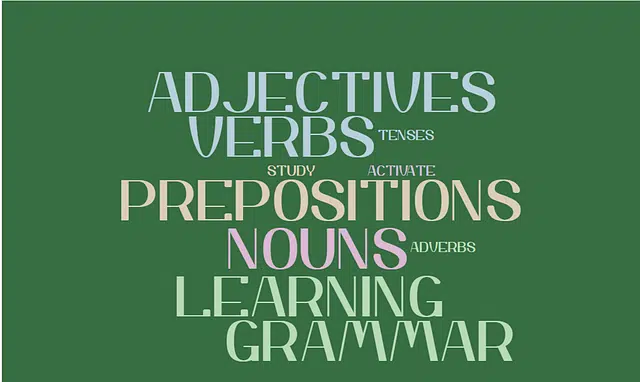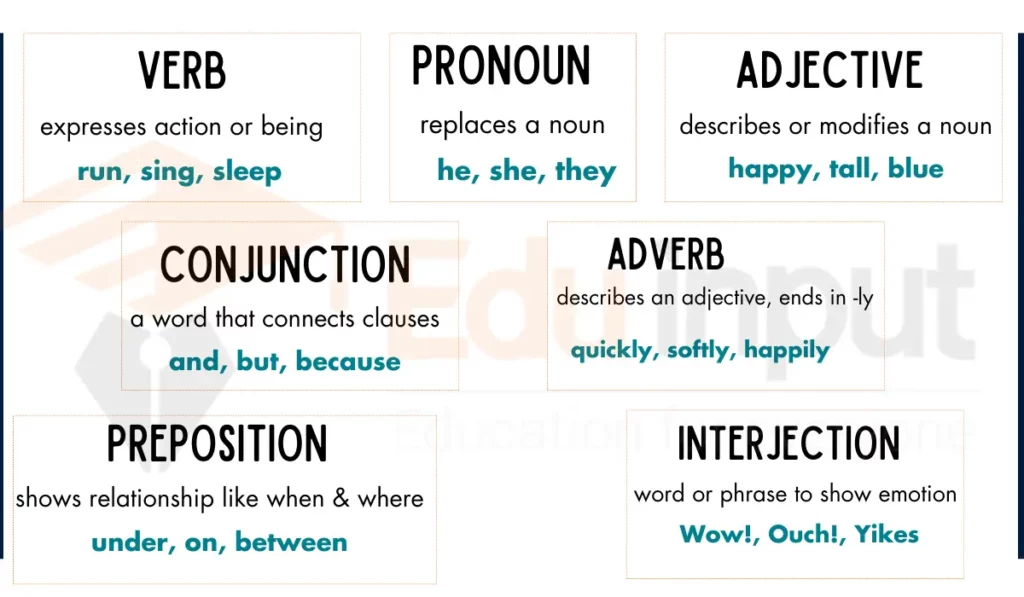Parts of Speech-Types, Examples, and Usage in Sentences
Parts of speech are categories of words with similar grammatical properties and functions in a sentence. The subject of a sentence can be a noun, pronoun, or noun phrase.

Parts of Speech
Here are the main parts of speech:

1: Nouns
Nouns are naming words. They name a person, place, thing or idea. For example: teacher, Miami, pencil, happiness. We use nouns to refer to the people, places, objects, substances and concepts that we talk about in language. Nouns give us a way to represent the world around us with words.
Examples
- People: doctor, teacher, friend, family
- Places: park, city, country, mountain
- Things: book, pencil, car, phone
- Ideas: love, happiness, freedom, time
2: Verbs
Verbs are action words. They express events or states of being. Verbs communicate what is happening in a sentence by demonstrating what the subject is doing or being. Along with nouns, verbs move sentences and stories forward; without them, language would be static.
Examples
- Action: run, jump, dance, sing, cook
- Being: sleep, think, exist, appear, become
3: Adjectives
Adjectives describe or modify nouns. They provide more details about nouns. For example: blue, fast, loud, funny. Adjectives make our sentences and stories more interesting because they add precision and color to the nouns in our language. They help answer questions like which one, what kind, or how many.
Examples
Red, blue, big, small, happy, sad, funny, interesting
4: Adverbs
Adverbs describe or modify verbs, adjectives, or other adverbs. They tell how, when, where, why, or to what extent something happens. Adverbs provide useful additional information about verbs, adjectives, or other adverbs that helps paint a clearer picture for the reader or listener.
Examples
Quickly, slowly, very, always, sometimes, happily, well
5: Pronouns
Pronouns take the place of nouns, so we don’t have to repeat the nouns. Pronouns function like nouns in a sentence, but let us avoid unnecessary repetition of nouns for the sake of smooth and efficient communication.
Examples
- I, you, he, she, it, we, they
- This, that, these, those, mine, yours, his, hers, its
- Myself, yourself, himself, herself, itself, ourselves, yourselves, themselves
6: Prepositions
Prepositions show the relationship between nouns and other words in a sentence. Common prepositions include: in, on, at, by, with, about, during. Prepositions clue the reader or listener into the positioning or context of the nouns in a sentence, answering questions like where, when or what about.
Examples
On, in, at, by, to, from, with, without, above, below
7: Conjunctions
Conjunctions join words, phrases, or clauses together. Common conjunctions are: and, but, so, because, while, although, neither/nor. Conjunctions connect individual words, phrases, and clauses in language into unified sentences and texts so we can communicate complex ideas. Logical relationships are built through conjunctions.
Examples
And, but, or, because, so, if, although, unless
8: Interjections
Interjections are words or phrases that express emotion or sentiment. A few examples are: oh! ouch! aha! wow! congrats. We use interjections to convey excitement, surprise, emphasis, disgust, pain, approval, encouragement, and other feelings.
In both spoken and written language, interjections show how we are reacting to the content. They are a useful tool for sharing our internal states. While interjections themselves do not hold much concrete meaning, they do allow us to communicate feelings which can greatly impact the meaning and tone behind our words.
Examples
Wow, ouch, hello, goodbye, oh, uh-oh,
Sentences With All Parts Of Speech
- The playful cat (Noun) chased (Verb) a small (Adjective) mouse (Noun) under (Preposition) the wooden (Adjective) table (Noun), and (Conjunction) it (Pronoun) squeaked (Verb) loudly (Adverb).
- In (Preposition) the morning (Noun), the (Article) energetic (Adjective) children (Noun) happily (Adverb) played (Verb) by (Preposition) the river (Noun).
- She (Pronoun) read (Verb) a fascinating (Adjective) book (Noun) quietly (Adverb) in (Preposition) her (Possessive Pronoun) cozy (Adjective) room (Noun).
- The (Article) diligent (Adjective) student (Noun) studied (Verb) diligently (Adverb) for (Preposition) the challenging (Adjective) exam (Noun).
- Suddenly (Adverb), a loud (Adjective) thunderstorm (Noun) startled (Verb) the (Article) frightened (Adjective) birds (Noun) in (Preposition) the (Article) tall (Adjective) trees (Noun).
- They (Pronoun) bought (Verb) fresh (Adjective) vegetables (Noun) and (Conjunction) fruits (Noun) at (Preposition) the (Article) vibrant (Adjective) market (Noun).
- The (Article) wise (Adjective) owl (Noun) hooted (Verb) softly (Adverb) from (Preposition) its (Possessive Pronoun) perch (Noun) in (Preposition) the (Article) ancient (Adjective) tree (Noun).
- After (Preposition) the (Article) exciting (Adjective) game (Noun), they (Pronoun) celebrated (Verb) joyfully (Adverb) with (Preposition) delicious (Adjective) pizza (Noun).
- Amazed (Adjective) by (Preposition) the (Article) breathtaking (Adjective) sunset (Noun), they (Pronoun) stood (Verb) silently (Adverb) on (Preposition) the (Article) sandy (Adjective) beach (Noun).
- Oh (Interjection)! I (Pronoun) forgot (Verb) to (Preposition) mention (Verb) the (Article) important (Adjective) news (Noun) about (Preposition) our (Possessive Pronoun) upcoming (Adjective) event (Noun).



Leave a Reply